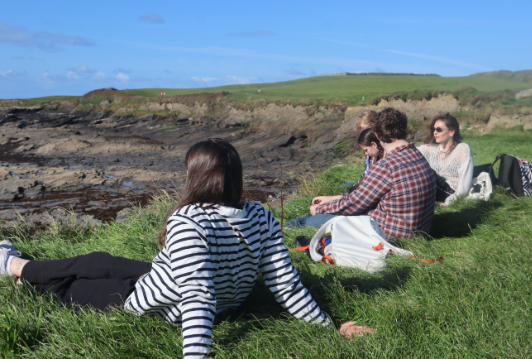A recent European Association of Study Abroad Associations (EUASA) conference session asked whether our field has reached an inflection point: a moment to reconsider how education abroad operates and the role it plays in society.
Questions such as what universities should contribute to society, and how higher education can best serve students’ real-world needs, are being discussed more openly than ever. Where does study abroad see itself in this evolving landscape?
A recalibrated approach to education abroad built around intentional, authentic community and environmental engagement remains a necessary step forward. Students are actively looking for the sector to take a proactive, real-world stance when it comes to climate and society.
Education abroad programs can complement what's happening on home campuses, providing focal points for students' curiosity and commitment. By being actively engaged, the field demonstrates that it's not an ivory tower, but an active member of civic society.
Old challenges, new challenges...& the challenge (?) of Gen Z
Old challenges still with us

The familiar issues facing higher education haven’t gone away. Fee income lost during Covid continues to pose difficulties for many institutions, and questions about how to sustain enrollment in a shrinking domestic student market persist.
The pandemic proved that online learning can work but it also reaffirmed something else: that in-person, experiential education still matters deeply. In this environment, universities as crucibles for skills development and personal growth are more vital than ever, especially for institutions dependent on strong recruitment and retention.
Study Abroad and the Higher Ed debate
Where does study abroad fit in this larger conversation? Many offices and providers have seen restructuring, mergers, or retrenchments as universities redefined “core” needs in the wake of the pandemic.
Study abroad has always needed to justify its contribution within the broader educational mission:
- Does it build resilience and genuine cultural engagement?
- Can the skills developed abroad be replicated on campus? If not, what makes them distinct?
- How does study abroad enhance the overall university experience, not merely mirror it?
New challenges: colleges, politics and the question of civics
Like buses, big questions asked of our sector all seem to come at once. If Covid tested our sector’s operating model, the more existential question now is: What role should higher education play in society?
Across the United States, higher education finds itself increasingly drawn into public debate: about civics, culture, and purpose. From different sides of the political spectrum, the call for universities to renew civic life has re-emerged, though with vastly different interpretations of what that means.

In this context, study abroad offers something rare: a chance to model civic responsibility through experience rather than rhetoric. By embedding students in communities, encouraging curiosity, and building empathy through engagement, education abroad quietly affirms the civic purpose of learning.
We are being looked upon to help reboot part of an eroded social contract, not by telling students what to think, but by helping them learn how to connect, listen, and contribute.
The expectations of Gen Z we need to meet
All of this ultimately circles back to the needs and expectations of our students. Whether driven by institutional strategy or genuine student demand, Gen Z (and now the emerging Gen Alpha) expect higher education to be:
- Purposeful. 72% of students cite skills development as more important than a university’s ranking. They see education as a means to a meaningful end.
- Flexible. Most still prefer in-person learning, but they value choice and hybrid models that reflect the modern world of work.
- Collaborative. The “sharing generation” thrives on learning experiences that build connection, not competition.
- Globally aware. They want their education to engage with real challenges — from inequality to sustainability — and to prepare them to act.
- Socially responsible. 75% say a college’s environmental and social commitments influence their decision to apply.
- Caring. Mental health pressures are rising sharply, and students want universities that actively support their well-being.
Putting community and climate friendly education at the center of study abroad

As we continue to grapple with the role of universities in society, education abroad stands at a crossroads. Meeting the evolving needs of both students and communities demands a renewed focus on intentional social and environmental engagement.
Study abroad offers something uniquely powerful: the chance to combine academic learning with lived experience. Through authentic, locally grounded engagement, students gain collaboration, empathy, and adaptability: qualities that underpin both global citizenship and personal resilience.
Where does a consideration of the climate fit in?
Whether framed as climate awareness, sustainability, or global responsibility, students expect universities to take environmental issues seriously. By integrating sustainability literacy into study abroad programs, institutions show not only ethical leadership but also practical foresight.
Our students are concerned about the planet’s future. It’s right that education abroad reflects that through partnerships, learning outcomes, and everyday practices that model stewardship and shared responsibility.
Addressing the mental health challenges faced by students
The rise in mental health declarations is a reminder of the need to create supportive environments that nurture student well-being. Community engagement plays a pivotal role. When students are actively involved in meaningful projects or civic initiatives, they develop a sense of belonging and purpose that helps prevent alienation and feelings of isolation.
The power of community-driven initiatives extends beyond the individual; it fosters a sense of shared responsibility, creating a positive ripple effect that benefits both students and broader society.

The shape of things to come
The “sharing generation” looks to higher education for more than just credentials. These young individuals want an experience that equips them to make a real difference.
By centering community, social responsibility and environmental awareness, study abroad can remain one of higher education's most transformative space.
The future of education abroad, and perhaps higher education itself, rests on our ability to deliver learning that's socially impactful, globally conscious and fosters a genuine sense of purpose.





.jpg)
